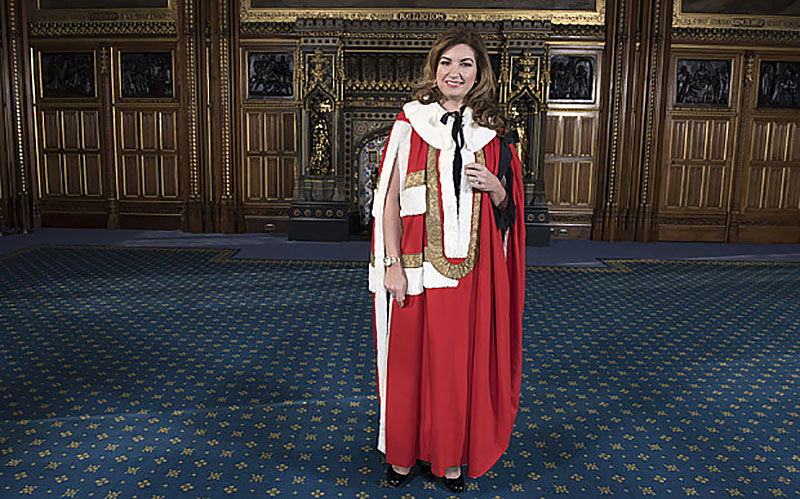The Football Governance Bill was relaunched last week in the House of Lords in which West Ham Vice Chairman Karren Brady sits as the Baroness of Knightsbridge CBE; the updated Bill will also now require clubs to provide ‘effective engagement’ with fans on ticket prices; the Government’s foreign and trade policy will no longer come into consideration regarding approving club takeovers.
With ticketing prices [concessions in particular] a hot topic at West Ham this season, there is certain to be a high level of fan interest into whether a news regulator will put an end to the type of policy which has caused Hammers supporters to take to protest to make themselves heard.
Last week the Premier League published a statement in which they said: “We remain concerned about the regulatory framework. Specifically, we believe rigid banking-style regulation, and the Regulator’s unprecedented and untested powers to intervene in the distribution of the Premier League’s revenues, could have a negative impact on the League’s continued competitiveness, clubs’ investment in world-class talent and, above all, the aspiration that drives our global appeal and growth.”
West Ham directors have been openly vocal against the bill also.
Last week Baroness Brady wrote in her Sun column: “To change, and to change for the better, are two different things. I remain wholly unconvinced about the role of regulators, both in and out of football. Just look at some of our leading industries and the way regulators have worked. Or not.
Water is the obvious one as our beaches and rivers have been transformed into a toxic dumping ground while the companies rake in millions in wages, bonuses and shareholder dividends — almost always of little or no benefit to the UK.
And don’t get me started on the trains. We have the most expensive railway network in the Western world, and best-paid train drivers, yet actually getting trains to run on time has been well-nigh impossible. So, please, when politicians preach about how the Football Governance Bill introduced in the House of Lords this week will make everything rosy in football’s garden, don’t believe the hype.
There is no need for another layer of administration and regulation. And I’ll tell you why…
The Premier League has been one of this country’s major success stories of the past three decades.
It has taken a game which was crumbling and collapsing around our feet to the best and most-watched football league in the world. It is the global Big One.
There are critics who say the Premier League just looks after the hotshots, the Manchester Uniteds and Arsenals. Rubbish.
In the last three years the Premier League has given a world-leading £1.6billion to the EFL, National Leagues, grass-roots football and the women’s game. Nowhere else in the world can even get close to matching that.
The PL give nearly £8m on average to every EFL Championship club, £1.4m to each League One club and £900,000 to each League Two club.
Politicians tell you the regulator will make clubs more fan-friendly but it is already being done.
The Premier League instigated a Fan Engagement Standard, meaning there has to be a Fan Advisory Board at every single club.
An away ticket price cap was introduced years ago, which ensures supporters pay a maximum of £30 when they travel.
At the rate we’re going you’ll get about half a bathtub for that from our regulated water companies.
I’ll give you some other numbers. The Premier League annually hands over £4.2bn in tax to the Treasury and directly employs 90,000 people, a third of whom are in the North West, an area which sadly has pockets of high deprivation.
A total of 51 clubs have reached the Premier League, which surely underlines the fact that the financial distributions do broadly work.
And while going into administration is a worrying time for fans, the likes of Crystal Palace, Luton, Bournemouth, Southampton and Leeds all reset and got to the Premier League — with three of them still in it.
What happened to Bury and others like them was terribly sad but you cannot blame the Premier League for their financial mess.
I’ve heard it said, mainly by ill-informed politicians, that parachute payments are fundamentally wrong. Not so. They allow clubs to remain financially sustainable should they suffer relegation from the top flight.
The regulator will have to consider INCREASING parachute payments as that is the only way established relegated clubs can be more sustainable.
They give clubs the security to be able to invest in competitive squads, sign players and coaches on multi-year contracts and invest in world-class stadia and fan experience, with the knowledge that there will be some financial protection in the event of relegation.
The cost of relegation
When you are relegated you still have to pay all the staff, including the players, and have all the same overheads, so if you don’t have the parachute payment you are effectively bust.
The numbers are what makes the Premier League the world’s leading domestic club competition.
Over 15million fans go to games every year and internationally OUR Premier League is watched annually by 1.5bn supporters from 189 countries.
In every sense of the word it is a success, with not a regulator in sight.
The Bill will change the way football operates, impacting supporters and clubs.
A regulator that delivers stronger oversight of fan engagement and club heritage — and prevents breakaway leagues — is welcome.
But one that significantly impacts the competitive balance of the league is not.”
West Ham’s Vice Chairman is not alone in her views as the Joint Chairman David Sullivan is also on the record in opposition against over regulation.


